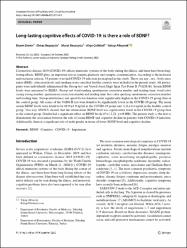| dc.contributor.author | Demir, Biçem | |
| dc.contributor.author | Beyazyüz, Elmas | |
| dc.contributor.author | Beyazyüz, Murat | |
| dc.contributor.author | Çelikkol, Aliye | |
| dc.contributor.author | Albayrak, Yakup | |
| dc.date.accessioned | 2023-05-06T17:19:34Z | |
| dc.date.available | 2023-05-06T17:19:34Z | |
| dc.date.issued | 2022 | |
| dc.identifier.issn | 0940-1334 | |
| dc.identifier.issn | 1433-8491 | |
| dc.identifier.uri | https://doi.org/10.1007/s00406-022-01514-5 | |
| dc.identifier.uri | https://hdl.handle.net/20.500.11776/11862 | |
| dc.description.abstract | Coronavirus disease 2019 (COVID-19) affects numerous systems of the body during the illness, and there have been long-lasting effects. BDNF plays an important role in synaptic plasticity and synaptic communication. According to the inclusion and exclusion criteria, 54 patients who had COVID-19 infection participated in this study. Thirty-six age-, sex-, body mass index (BMI)-, education level- and smoking status-matched healthy controls were included in the present study. All participants were individually administered the Stroop test and Visual Aural Digit Span Test Form B (VADS-B). Serum BDNF levels were measured by ELISA. Stroop test word reading spontaneous correction number and reading time, word color saying wrong number, spontaneous correction number and reading time, box color speaking spontaneous correction number and reading time, Stroop interference and speed factor duration were significantly higher in the COVID-19 group than in the control group. All scores of the VADS-B test were found to be significantly lower in the COVID-19 group. The mean serum BDNF levels were found to be 10.9 +/- 6.9 ng/ml in the COVID-19 group and 12.8 +/- 6.4 ng/ml in the healthy control group. Two-way ANOVA showed that the serum mean BDNF level was significantly lower in the COVID-19 group than in the control group. Gender had a significant effect on BDNF levels (F = 12.21; p = 0.008). The present study is the first to demonstrate the association between the role of serum BDNF and cognitive decline in patients with COVID-19 infection. Additionally, there is a significant role of male gender in terms of lower BDNF level and cognitive decline. | en_US |
| dc.language.iso | eng | en_US |
| dc.publisher | Springer Heidelberg | en_US |
| dc.identifier.doi | 10.1007/s00406-022-01514-5 | |
| dc.rights | info:eu-repo/semantics/openAccess | en_US |
| dc.subject | BDNF | en_US |
| dc.subject | Cognitive | en_US |
| dc.subject | COVID-19 | en_US |
| dc.subject | Impairment | en_US |
| dc.title | Long-lasting cognitive effects of COVID-19: is there a role of BDNF? | en_US |
| dc.type | article | en_US |
| dc.relation.ispartof | European Archives Of Psychiatry And Clinical Neuroscience | en_US |
| dc.department | Fakülteler, Tıp Fakültesi, Dahili Tıp Bilimleri Bölümü, Ruh Sağlığı ve Hastalıkları Ana Bilim Dalı | en_US |
| dc.department | Fakülteler, Tıp Fakültesi, Temel Tıp Bilimleri Bölümü, Tıbbi Biyokimya Ana Bilim Dalı | en_US |
| dc.authorid | ÇELIKKOL, ALIYE/0000-0002-3799-4470 | |
| dc.institutionauthor | Demir, Biçem | |
| dc.institutionauthor | Beyazyüz, Elmas | |
| dc.institutionauthor | Beyazyüz, Murat | |
| dc.institutionauthor | Çelikkol, Aliye | |
| dc.institutionauthor | Albayrak, Yakup | |
| dc.relation.publicationcategory | Makale - Uluslararası Hakemli Dergi - Kurum Öğretim Elemanı | en_US |
| dc.authorwosid | ÇELIKKOL, ALIYE/ABE-2695-2020 | |
| dc.authorwosid | BEYAZYÜZ, Elmas/ABA-7951-2020 | |
| dc.identifier.wos | WOS:000881532200001 | en_US |
| dc.identifier.scopus | 2-s2.0-85141675711 | en_US |
| dc.identifier.pmid | 36355087 | en_US |



















